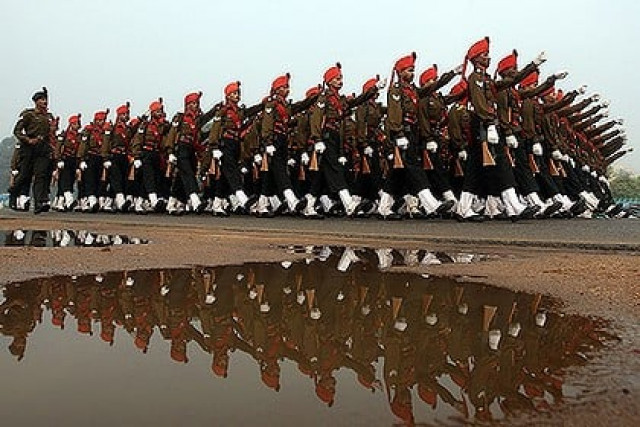‘New Delhi rolls back army downsizing plan’
Anomalies revealed in India's outlay for defence may have effect on growth and development of its fighting arms.

While accepting the 11.6 per cent increase in the defence outlay over last year’s revised estimate figures as adequate, experts say there are worrying trends in spending that need to be corrected.
On the revenue side, salaries and allowances have gone up by nearly Rs50 billion over the revised estimates. In fact, the revised estimates themselves had gone up nearly Rs30 billion over last year’s budget estimates. This clearly indicates that a plan by General VP Malik, a former chief of army staff, a few years ago to downsize the army has not been put into motion. “In fact, this plan (to downsize) has been rolled back and this is going to be a serious problem in the future,” said Laxman Behera, an expert on defence finance in the Institute of Defence Studies and Analyses. The army’s salaries and allowances outlay alone account for Rs642.51 billion, up from a revised estimate figure of Rs 605.30 billion in 2010-11.
The burgeoning size of the three arms naturally reflects in the pension bill. Defence pensions were Rs250 billion in the year 2010-2011. They have increased to Rs340 billion in 2011-12 on account of arrears accruing from the Sixth Pay Commission award. Pensions, Behera says, are growing at 10 per cent annually and raise questions about the long-term viability of defence spending.
However, experts say the fact that allocations for ‘stores; - the equipment, food and other day-to-day necessities– is going up (from a revised estimate of Rs213.82 billion to Rs227.99 billion in 2011-12) for the three services is heartening for it represents improvement in the quality of life of troops as well as officers.
On the capital outlay, Behera says the fine print suggests that although the three services did not return money to the treasury unutilised, there is a wide gap in the money allocated under some heads and its actual utilisation. For instance, in the 2010 -11 budget, the army was allotted Rs6.36 billion for aircraft. But it managed to spend only Rs1.48 billion. However, because it spent more than it was allocated under other capital heads, the gap is not visible. So the underlying issue – that of utilisation of money in time – continues to be a cause for concern.
Published in The Express Tribune, March 2nd, 2011.



















COMMENTS
Comments are moderated and generally will be posted if they are on-topic and not abusive.
For more information, please see our Comments FAQ